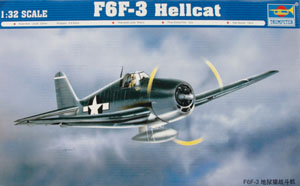Trumpeter 1/32 F6F-3 Hellcat
|
 |
Overview
The Grumman F6F was a development of their F4F Wildcat, with Grumman
utilizing the combat knowledge gained from the Wildcat to produce an all-new
fighter. The result was the Hellcat, easily the most successful Navy fighter
of the Second World War. Flying with both the US Navy and the Royal Navy,
the F6F flew from carriers all around the globe, and were even used as
flying bombs during the Korean War.
In an interesting anecdote, a Hellcat drone, unpiloted and having lost
ground control, managed to successfully evade repeated rocket attacks
from two F-89 Scorpions over Palmdale, California in 1956. Whether that
was due to the performance of the Hellcat, or the lack of performance
of unguided rockets fired from the Scorpions, or a huge amount of luck,
I’ll let you decide. Regardless, the Hellcat was incredibly successful
in combat.
The Kit
Trumpeter’s new kit of the F6F Hellcat is a welcome replacement
for the old Hasegawa Hellcat, with much better detailing throughout. Molded
in gray plastic, the kit has recessed panel lines throughout, a detailed
engine, a folded wing option, detailed gun bays, and much more. The decal
sheet provides markings for a couple early Hellcats, and as an added bonus
the kit comes with a nice little tractor model.
 ..... .....
Construction, like with most kits, begins with the interior, and this
one really has one that will shine. There’s not many kits out there
that start out with a five-piece gunsight, but this kit has just that.
The cockpit detail is like that throughout, and together with the engine
take up a full seven pages of the instruction book. While some might be
tempted to go with a resin replacements, the parts out of the box will
look outstanding.
 ..... .....
With the cockpit and engine done, the only things left for inside the
fuselage are the radio shelves and tailwheel assembly. With those in place,
the fuselage gets buttoned up and your Hellcat begins to look like a Hellcat.
The lower fuselage under the wings is molded with the bottom wing stubs
out to the wing fold, providing a solid attachment as well as good alignment
for the landing gear. The wheel wells are made up of several side pieces,
all of which need to be put in place before the upper wing sections can
be fitted. These also provide the exposed wing structure for the folded
wing option.
 ..... .....
Moving outboard, the outer wing sections have open gun bays with detailed
machine guns included. All of the flying surfaces are separate as well,
a nice touch. For underneath, the kit includes a couple of options to
hang under the wings, including rockets and bombs. For the centerline
there is the almost standard drop tank. The landing gear is nicely done,
with vinyl wheels having two-piece hubs and sturdy struts with multi-part
oleo scissors. With the tailplanes in place, the remainder is straightforward,
and the kit is ready for paint.
 ..... .....
The two decal options are both finished in three-color camouflage, which
makes for an attractive Hellcat in my opinion. The two choices are both
for well-known Navy pilots. The first is Lt. Cmdr Alex Vraciu of VF-6
off the USS Intrepid. Coded Black 19, this option does not have much else,
just a black 19 on the fuselage and tail. The second choice is David McCampbell’s
aircraft from CVG-15 off the USS Essex. This option is even more plain
than Vraciu’s Hellcat, as it only has the “Minsi” name
on the fuselage.
 ..... .....
Conclusion
This should build up into an impressive model of the Hellcat, and I’m
sure that we will see quite a few of these on the contest tables in the
future. My thanks to Stevens International
for the review sample. |
|
